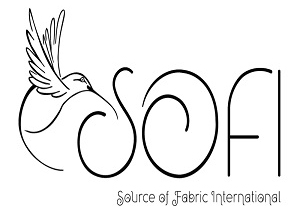If you’re diving into the world of fabric wholesale, understanding the role of the Better Business Bureau (BBB) can be a game-changer for your business. The BBB serves as a trusted resource, helping you gauge the reliability of suppliers and ensuring you’re making informed decisions. By connecting with fabric wholesalers that have strong BBB ratings, you can minimize risks and enhance your purchasing experience.
Choosing a reputable supplier is crucial in the fabric industry, where quality and service can vary widely. With the BBB’s insights, you can discover valuable information about a company’s history, customer reviews, and any complaints filed against them. This knowledge empowers you to build a solid foundation for your fabric sourcing, ensuring you get the best products for your needs while maintaining peace of mind. Let’s explore how leveraging the BBB can elevate your fabric wholesale experience.
Understanding Fabric Wholesale Direct
Fabric wholesale direct refers to sourcing fabric from manufacturers or distributors who sell directly to retailers or consumers, skipping intermediaries. This approach allows you to buy at lower prices while gaining access to a wide variety of fabric types and patterns.
Definition of Fabric Wholesale
Fabric wholesale involves purchasing fabrics in large quantities at reduced rates. Wholesalers often supply a diverse range of materials including cotton, polyester, silk, and more. These suppliers cater to businesses in need of heavy inventory for resale or production. Buying wholesale can significantly cut down costs compared to retail prices.
Benefits of Buying Direct from Wholesalers
Buying directly from wholesalers presents several benefits.
- Cost Savings: Direct purchases typically come with lower prices due to eliminated middlemen.
- Wide Selection: Wholesalers often stock various fabric types and colors to meet diverse needs.
- Bulk Purchasing: Buying in bulk leads to further discounts and ensures a steady supply for your projects.
- Access to Samples: Many wholesalers provide fabric samples, enabling you to assess quality before commitment.
- Direct Communication: Working directly with wholesalers ensures clear communication and fosters better relationships.
Utilizing these advantages enhances your fabric sourcing experience while ensuring quality and affordability.
Choosing a Reliable Supplier
Finding a reliable supplier is essential in the fabric wholesale market. A trustworthy supplier ensures good quality materials and dependable service.
Importance of the Better Business Bureau (BBB)
The Better Business Bureau (BBB) offers vital insights into suppliers’ reliability. It provides ratings based on customer reviews and complaints, allowing businesses to gauge the level of trust. The BBB’s database features details about companies with issues or unresolved conflicts. This information helps minimizing risks associated with choosing a supplier. Utilizing the BBB during your search can enhance your confidence as you look for materials. Suppliers with good BBB ratings often demonstrate commitment to customer satisfaction, which is crucial for long-term relationships.
How to Find BBB Accredited Wholesalers
Finding BBB accredited wholesalers simplifies the search for reliable suppliers. Start by visiting the BBB website and using their search tool to look for fabric wholesalers in your area. Filter your results by accreditation status to ensure you find trusted suppliers. Read customer reviews attached to each business profile for insights into their reliability. Consider contacting suppliers directly for quotes and further details about their offerings. Check the BBB’s disclosures regarding any complaints filed against the suppliers you consider.
Evaluating Supplier Reputation
Evaluating Supplier Reputation involves more than just checking BBB ratings. Look at customer feedback from various platforms, including social media and industry forums. Conduct online searches for any news or issues reported about the supplier. Investigate their responsiveness to inquiries and complaints, reflecting their commitment to service. Request references from other clients who have sourced fabrics from them. Compare the experiences of multiple clients to gain a clear picture of their reliability and quality.
Verifying Company Information
Verifying company information ensures that you choose a reliable fabric wholesale supplier. Gather key details from reputable sources to assess their legitimacy.
Checking Business Credentials
Check business credentials to confirm a supplier’s legitimacy. Verify the business name, address, and phone number. Cross-reference this information with the supplier’s website and social media profiles. Look for their business registration details, which can often be found in state or local business directories. Ensure that the business has a valid sales tax ID and any relevant industry certifications. Check for BBB accreditation, which signals that the company meets specific standards of trustworthiness. Utilizing these steps helps you identify trusted suppliers who are committed to ethical practices.
Understanding Customer Reviews
Understanding customer reviews offers insight into a supplier’s service quality. When evaluating reviews, focus on platforms such as the BBB, Google, and Yelp. Look for consistent patterns in feedback, noting any recurring issues or praises related to product quality, shipping times, and customer service interactions. Analyze both positive and negative reviews to gain a balanced perspective. Make sure to consider the number of reviews; a few positive reviews may not reflect the supplier’s overall reliability. Prioritize suppliers with a high volume of favorable feedback, as they typically indicate a strong reputation in the market.
Importance of Transparency in Business Practices
Importance of transparency in business practices cannot be understated. A reputable fabric wholesale supplier openly shares information about their sourcing methods, pricing structures, and return policies. Look for suppliers that provide clear communication regarding their practices and product details. Transparency helps build trust and assures you of their commitment to quality and ethical standards. A supplier willing to discuss their processes is more likely to ensure customer satisfaction. If possible, request documentation on production processes or certifications to fully assess their operations.
Making the Purchase
Steps to Place an Order
Placing an order with a fabric wholesale supplier involves several straightforward steps.
- Research Suppliers: Start by identifying reliable fabric wholesalers. Use the BBB website to check ratings and customer reviews.
- Select Fabrics: Browse the catalog or website of your chosen supplier to find the types of fabrics you need. Take note of various styles, colors, and patterns.
- Request Samples: If possible, request samples to assess the fabric quality before making a larger purchase. Many wholesalers provide samples for a small fee or free.
- Specify Quantity: Determine the quantity of fabrics required for your project. Most wholesalers offer bulk pricing, so decide based on your inventory needs.
- Place Order: Once you finalize your selection, contact the supplier to place your order. Confirm details such as price, quantity, and delivery timelines.
Following these steps helps ensure a smooth ordering process while securing quality fabrics at competitive prices.
Understanding Pricing and Discounts
Understanding pricing structures and available discounts influences your purchasing decisions.
- Base Pricing: Review the base price for each fabric type. Prices often vary based on fabric quality and pattern complexity.
- Bulk Discounts: Ask about bulk discounts. Many wholesalers provide a percentage off when purchasing larger quantities, allowing for cost savings.
- Seasonal Promotions: Keep an eye out for seasonal sales or promotional events that may offer reduced prices or special deals.
- Membership Discounts: Some suppliers offer membership programs with exclusive discounts for returning customers. Consider joining these programs if available.
- Shipping Costs: Factor in shipping costs when calculating your total expenditure. Some suppliers may offer free shipping over a specific order value, so ensure to reach that threshold if possible.
Being aware of these pricing details helps you maximize your budget while acquiring quality fabrics.
Payment Methods to Consider
Choosing the right payment method for your fabric purchase is essential for a secure transaction.
- Credit Cards: Using credit cards provides protection against fraud and often earns rewards or cash back. Ensure the supplier accepts major credit cards for convenience.
- PayPal: PayPal offers a secure method for online transactions and protects your financial information during purchases.
- Wire Transfers: Some suppliers may require wire transfers for large orders. Ensure you understand the fees and processing times associated.
- Net Terms: Confirm if the wholesaler offers net payment terms. This option allows you to receive products before payment is due, which may be useful for cash flow management.
- Escrow Services: For large transactions, consider using an escrow service that holds payment until you confirm receipt and satisfaction with the order.
Selecting a secure payment method reduces risk while ensuring a smooth purchasing experience.
Delivery and Shipping
Delivery and shipping play a crucial role in the fabric wholesale process. Ensuring timely and reliable shipping methods enhances customer satisfaction and helps maintain steady inventory.
Importance of Timely Delivery
Timely delivery directly impacts your business operations. Delays can lead to missed deadlines, unhappy customers, and lost sales. Establish clear timelines with suppliers to set expectations. When you place an order, determine the delivery timeframe. Confirm that the supplier can meet your production needs. In industries where trends change rapidly, having stock on time can keep you ahead of competitors. Reducing lead times helps maintain a smooth supply chain. Therefore prioritizing timely delivery supports your overall business success.
Shipping Options to Discuss with the Supplier
Discuss various shipping options with your supplier to find the best fit for your business. Common shipping methods include standard ground, expedited services, or freight shipping for bulk orders. Understand the shipping costs associated with each method. Evaluate delivery times to determine what aligns with your timeline. Some suppliers might also offer drop shipping options, allowing you to ship directly to customers rather than store inventory. Evaluate additional services like tracking and package handling as these factors can improve the shipping experience.
Insurance on Your Shipment
Insurance on your shipment protects against potential loss or damage during transit. Many suppliers offer insurance options for added peace of mind. Assess the value of the goods being shipped to determine the appropriate coverage. In case of unforeseen events like theft or damage, insurance helps minimize financial loss. Always confirm insurance details, including claims processes and coverage limits. Request documentation that outlines these terms for your records. Investing in shipment insurance ensures that your business remains secure while reducing risk.
Troubleshooting Common Issues
Addressing common issues that may arise when dealing with fabric wholesale suppliers ensures a smooth experience. Tackling these challenges directly impacts business efficiency and satisfaction.
What to Do if There is a Problem with the Order
If you encounter an issue with an order from a fabric wholesale supplier, act promptly. Start by reviewing the order confirmation, checking details such as item descriptions, quantities, and pricing. Then, contact the supplier’s customer service department. Provide clear information about the problem, including your order number and relevant details. If the issue involves wrong items or discrepancies in quantities, request corrections or replacements. Document all communications for reference. If the resolution isn’t satisfactory, escalate the issue to a higher authority within the company. Aim for a resolution that aligns with your expectations.
Handling Returns and Exchanges
Handling returns and exchanges correctly prevents further complications. Review the supplier’s return policy before initiating a return. Most fabric wholesalers allow returns within a specific timeframe, typically 30 days, provided the items are unused and in original condition. Prepare the items for return by checking packaging requirements. Include a copy of the receipt and any forms required by the supplier. Ship items back using a reliable method that allows tracking. Keep records of all correspondence related to the return process. If seeking an exchange, clearly state the desired replacement items and ensure they’re available. Prompt action aids in resolving exchanges efficiently.
Contacting the Better Business Bureau for Complaints
If issues remain unresolved after contacting your fabric wholesale supplier, contacting the Better Business Bureau (BBB) serves as a helpful step. Gather all relevant documentation, including order details, communication records, and any evidence of the issue. Go to the BBB website and find the section for filing complaints. Fill in the necessary fields, clearly outlining your experience and concerns. Provide concise, factual statements about the problem. The BBB will forward your complaint to the supplier, facilitating a resolution. Stay updated on the complaint status by checking your BBB account and responding to any inquiries promptly.
Tips for Successful Wholesale Purchasing
Successful wholesale purchasing requires strategic planning and effective execution. Here are some key tips to enhance your purchasing experience.
Negotiating Better Rates
Negotiate better rates with suppliers by being informed about market prices. Research competitors’ pricing and gather data on various suppliers’ offerings. Approach suppliers with a clear understanding of your budget and requirements.
Present your purchasing volume as leverage during negotiations. Suppliers often provide discounts for larger orders. Establish rapport and demonstrate loyalty through repeat purchases, which can lead to further price reductions. Clearly outline terms such as payment schedules and delivery timelines during discussions to ensure mutual agreement.
Stay open to discussing additional perks like free shipping or promotional offers. Maintaining a friendly and professional tone throughout negotiations fosters positive relationships and can contribute to better overall deals.
Building Long-term Relationships with Suppliers
Build long-term relationships with suppliers to ensure a reliable sourcing network. Establish trust through consistent communication. Regular check-ins and feedback on orders strengthen connections and enhance collaboration.
Value the partnership by placing consistent orders and honoring agreements. Acknowledging supplier efforts through appreciation or testimonials can foster goodwill.
Participate in supplier events or stay engaged with newsletters to keep abreast of new products or promotions. These actions encourage suppliers to prioritize your business, helping you secure favorable terms and timely deliveries.
Being receptive to suppliers’ suggestions also supports a collaborative approach, leading to more beneficial arrangements over time.
Keeping Track of Orders and Inventory
Keep track of orders and inventory systematically to streamline operations. Use inventory management software to monitor stock levels in real time. Set reorder points to prevent shortages and ensure smooth production.
Maintain organized records of past orders, including supplier details, pricing, and delivery dates. This information is essential for future negotiations and troubleshooting.
Regularly review inventory data and order patterns to identify trends. This analysis helps optimize purchasing decisions, enabling cost-effective procurement.
Schedule regular audits of inventory to reconcile physical counts with recorded data. Staying proactive in inventory management helps maintain efficiency and supports better decision-making in the wholesale purchasing process.
Conclusion
Navigating the fabric wholesale market can be a challenge but leveraging the Better Business Bureau’s resources makes it easier for you to find trustworthy suppliers. By focusing on BBB accreditation and customer feedback you can ensure you’re making informed choices that enhance your purchasing experience.
Establishing strong relationships with reliable wholesalers not only saves you money but also guarantees quality materials for your business. Remember to stay proactive in your research and communication to avoid potential issues down the line. With the right strategies in place you’ll be well-equipped to thrive in the fabric wholesale industry.
Frequently Asked Questions
What is the role of the Better Business Bureau (BBB) in the fabric wholesale industry?
The BBB helps assess the reliability of suppliers in the fabric wholesale industry by providing insights into their ratings, customer reviews, and complaint history. This information enables businesses to make informed decisions and minimize risks when sourcing materials.
How does fabric wholesale direct work?
Fabric wholesale direct means sourcing fabrics straight from manufacturers or distributors without intermediaries. This approach typically results in lower prices and a broader selection of fabric types and patterns, benefiting businesses needing large quantities of inventory.
Why is choosing a reliable supplier important in fabric wholesale?
A reliable supplier ensures quality materials and dependable service. Trustworthy suppliers positively impact the purchasing experience, helping businesses avoid costly mistakes and ensuring they receive quality products that meet their needs.
How can I find BBB accredited fabric wholesalers?
To find BBB accredited wholesalers, visit the BBB website, search for local suppliers, and filter results by accreditation status. Reading customer reviews on the site will also provide insights into the suppliers’ reputations and reliability.
What should I check to verify company information for fabric suppliers?
Verify company credentials by checking their business name, address, phone number, industry certifications, and confirming their BBB accreditation. This ensures the legitimacy of fabric wholesale suppliers and protects against potential scams.
How should I interpret customer reviews when sourcing fabric?
Analyze feedback from multiple platforms like BBB, Google, and Yelp to gauge service quality. Look for consistent positive or negative trends that can indicate overall customer satisfaction and reliability of the supplier.
What steps should I follow to place an order with a fabric wholesale supplier?
Begin by researching suppliers, selecting fabrics, and requesting samples. Specify your order quantity and then proceed to place the order, ensuring you understand pricing structures and available discounts.
What payment methods are recommended for fabric wholesale purchases?
Secure payment methods like credit cards, PayPal, wire transfers, or escrow services are recommended for fabric wholesale purchases. These options help ensure a smooth and secure transaction process.
Why is delivery and shipping important in the fabric wholesale process?
Timely delivery affects business operations and customer satisfaction. Establish clear timelines with suppliers, choose appropriate shipping options, and consider shipment insurance to protect against loss or damage during transit.
How can I resolve issues with fabric wholesale orders?
If issues arise, review your order details, contact customer service, and document communications. Understand the supplier’s return policy for exchanges, and if unresolved, consider filing a complaint with the BBB for further assistance.


